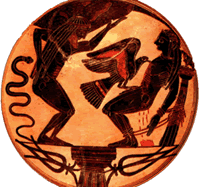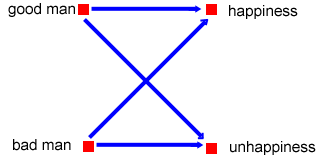ἦθος / Character
1) moral and ethical character
 Aristotle, predictably, rates the value of situations and events in a drama according to the emotional impact they will have on an audience. Needless to say, such a judgment is predicated on the amount of empathy or emotional involvement the audience will have with the characters on stage, and, in order for that involvement to exit, he concludes that the audience must deem the tragic hero to be a worthy person. Otherwise, an audience would feel neither fear nor pity in witnessing a bad or unsympathetic character experience a painful outcome as a result of his actions. Consequently, Aristotle states that the tragic hero must have a character the audience considers to be good. Unlike contemporary psychological understandings of "character," Aristotle's understanding implies a value judgment, and such a judgment implies moral or ethical overtones. These overtones reverberate throughout the text of the Poetics.
Aristotle, predictably, rates the value of situations and events in a drama according to the emotional impact they will have on an audience. Needless to say, such a judgment is predicated on the amount of empathy or emotional involvement the audience will have with the characters on stage, and, in order for that involvement to exit, he concludes that the audience must deem the tragic hero to be a worthy person. Otherwise, an audience would feel neither fear nor pity in witnessing a bad or unsympathetic character experience a painful outcome as a result of his actions. Consequently, Aristotle states that the tragic hero must have a character the audience considers to be good. Unlike contemporary psychological understandings of "character," Aristotle's understanding implies a value judgment, and such a judgment implies moral or ethical overtones. These overtones reverberate throughout the text of the Poetics.



In considering the relationship of moral character to tragic outcomes (μεταβολὴ), Aristotle ponders the possible arrangements that could result from the combinations of good and bad character and happy and unhappy outcomes. The process of exploring all the possible permutations reflects a logical pattern that becomes a familiar methodology in the Poetics.
Selecting an arrow (click for English text, double-click for Greek) will enable you to view Aristotle's comments on the dramatic viability of that option.
Interestingly enough, the fall of a good person is the most familiar pattern reflected in ancient Greek tragedy. As Aristotle subsequently explains, there are circumstances that relieve this pattern of events of its "morally shocking" quality and charge it with fear and pity. These circumstances result in the tragic hero acting either under incontestable compulsion or as the result of a mistake that any reasonable person might have made.
 Aristotle, predictably, rates the value of situations and events in a drama according to the emotional impact they will have on an audience. Needless to say, such a judgment is predicated on the amount of empathy or emotional involvement the audience will have with the characters on stage, and, in order for that involvement to exit, he concludes that the audience must deem the tragic hero to be a worthy person. Otherwise, an audience would feel neither fear nor pity in witnessing a bad or unsympathetic character experience a painful outcome as a result of his actions. Consequently, Aristotle states that the tragic hero must have a character the audience considers to be good. Unlike contemporary psychological understandings of "character," Aristotle's understanding implies a value judgment, and such a judgment implies moral or ethical overtones. These overtones reverberate throughout the text of the Poetics.
Aristotle, predictably, rates the value of situations and events in a drama according to the emotional impact they will have on an audience. Needless to say, such a judgment is predicated on the amount of empathy or emotional involvement the audience will have with the characters on stage, and, in order for that involvement to exit, he concludes that the audience must deem the tragic hero to be a worthy person. Otherwise, an audience would feel neither fear nor pity in witnessing a bad or unsympathetic character experience a painful outcome as a result of his actions. Consequently, Aristotle states that the tragic hero must have a character the audience considers to be good. Unlike contemporary psychological understandings of "character," Aristotle's understanding implies a value judgment, and such a judgment implies moral or ethical overtones. These overtones reverberate throughout the text of the Poetics. 



